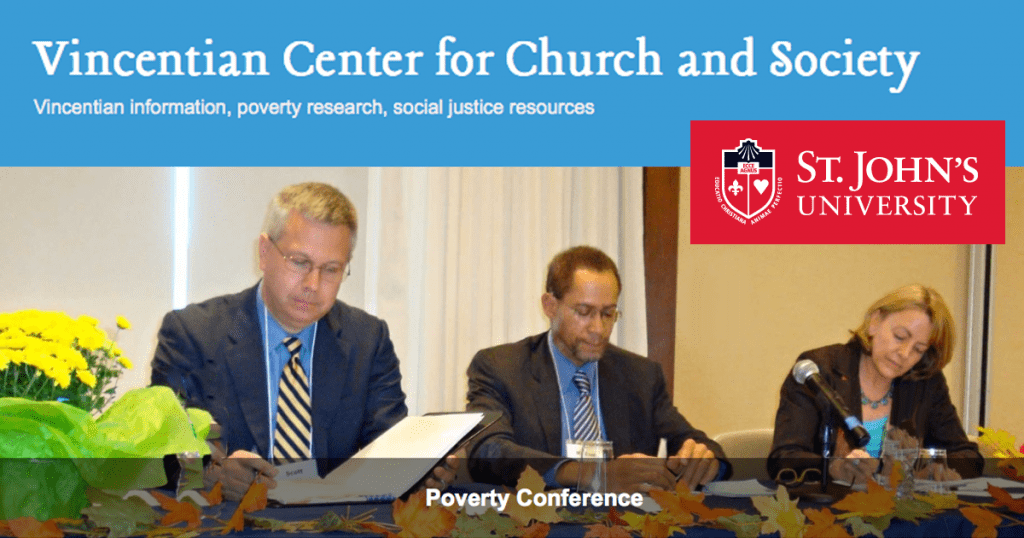
The Vincentian Center for Church and Society at St. John’s—along with the faculty Vincentian Research Fellows—hosted the daylong event, entitled “Care for Our Common Home: The Cry of the Earth and the Cry of the Poor.” Approximately 240 participants, attendees, faculty, and students took part in panels, break-out meetings, and question-and-answer sessions.
His Holiness Pope Francis’s deep concern for the global ecological crisis and its impact on the poor was the topic of the Ninth Biennial Vincentian Chair of Social Justice Conference, held on January 30 at the Queens, NY, campus.
“Pope Francis’s goal of uniting people to address the care for our common home has special meaning to St. John’s University and the entire Vincentian community,” said Rev. Bernard M. Tracey, C.M., Executive Vice President for Mission. “Our faculty members from across the disciplines are leaders in the field in terms of Catholic education, teaching, conducting research, and promoting social justice. This event is a natural extension of their commitment to this critical issue.”
The gathering, known as “the poverty conference,” brought together theologians, economists, scientists, and other experts whose charge was to develop specific action plans in response to the encyclical Laudato Si’: On Care for Our Common Home—the Pope’s document on combating the ecological crisis. In it, the Holy Father urgently appeals for “a new dialogue about how we are shaping the future of our planet.” A Vigil Mass followed in St. Thomas More Church.
Rev. Bryan N. Massingale, S.T.D. ’01HON, Professor of Systematics/Ethics at Marquette University, received a standing ovation for his keynote address, entitled “The Evidence of Things Unsaid: The Silence About Racism in the Care for Creation.” In his 40-minute talk, he framed the issue of environmental racism through the lens of the yearlong water contamination situation in Flint, MI.
“The events unfolding in Flint provide a tragic illustration of the nexus between caring for creation and care of the poor, of the deep connection between racism and environmental neglect, and of the confluence of social neglect and ecological harm,” said Fr. Massingale. “Environmental racism is a reality in this country, where communities of color have long borne the brunt of degraded neighborhoods and a higher prevalence of environmentally-linked diseases. There is one interwoven story here—care for the Earth is impossible in the absence of a proactive concern about racism.”
Panel presenters and dialogue session participants included Anthony Annett, Ph.D., Columbia University; Erin Lothes, Ph.D., College of Saint Elizabeth; John C. Mutter, Ph.D., Columbia University; Juan Elias Chebly ’08TCB, ’09MBA, a lead advisor to the UN Environment Programme (UNEP); Elham Seyedsayamdost, Ph.D., University of Massachusetts Boston; Joanne Carroll, Ph.D., College of Pharmacy and Health Sciences, St. John’s University; and Basilio Monteiro, Ph.D., College of Professional Studies, St. John’s University.
“Our faith and hope is to provide a vision of a just, peaceful, and sustainable world,” Lothes said. “The challenge to this vision is the ecocidal scale of environmental injustice.” She added, “To solve it, we need to address both sides of the crisis—the environment needs to be stabilized for all of us experiencing the impacts of climate change, and justice needs to be created for those suffering energy poverty.”
Christine Hammill-Cregan, Associate Director, Vincentian Center for Church and Society, characterized the encyclical as being about people, at its core. “It isn’t just for Catholics. It’s a 92-page letter to everyone, a call to action on all levels,” she said. “That’s a very strong message—caring for the planet is about people.”
“When most people hear the phrase ‘social justice,’ their first instinct is a desire to help,” said Mitchell Petit-Frere ’16G. “However, you need to be informed in order to lend a hand and this conference equipped me with the tools to do so,” he said. “The event fostered new thoughts and perspectives within the minds of others—which may end up leading to social progress outside the University’s gates.”
Rev. Patrick J. Griffin, C.M., Executive Director of the Vincentian Center for Church and Society, delivered the homily at the Mass that culminated the day’s events. “We are here on this day to give special attention to the document Laudato Si’ and the message of Pope Francis on behalf of our environment—which can place him as a prophet among us,” he said. “Pope Francis takes up the role of a prophet in this effort and he must do so. These experts who have gathered among us today legitimize his voice.”
– See more at: stjohns.edu







0 Comments